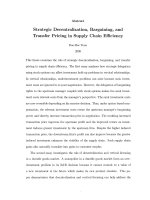cash is king - and so is your supply chain
Bạn đang xem bản rút gọn của tài liệu. Xem và tải ngay bản đầy đủ của tài liệu tại đây (107.82 KB, 10 trang )
eBook
Cash is King—And So is Your Supply Chain:
How Mid-Market Companies Can Optimize Supply Chain Operations for Strong Cash Flow and Focused Growth
2
Cash is King - And So is Your Supply Chain: How Mid-Market Companies Can Optimize Supply Chain Operations for Strong Cash Flow and Focused Growth
Content
Introduction 3
Why Seek Out Supply Chain Eciencies 4
Manage Cash by Managing Inventory 5
New Technology Puts Eciencies at Your Fingertips 7
Conclusion 8
3
Cash is King - And So is Your Supply Chain: How Mid-Market Companies Can Optimize Supply Chain Operations for Strong Cash Flow and Focused Growth
Introduction
Cash Flow Management
For companies of all sizes and across all industries, cash is not only crucial –
it’s king. Businesses must carefully manage the ow of their cash – making
sure that payments aren’t going out faster than resources are coming in
– simply to survive. According to a recent study by Dun & Bradstreet on
business failures, companies that do monthly cash ow planning have an
80 percent survival rate – more than double the 36 percent survival rate
for those only planning once a year.
1
This discrepancy is partially because
careful planning helps your company build up a solid cash reserve, and
that reserve can serve as a life vest when there are weather disruptions,
economic downturns or other unexpected obstacles.
A strong cash position isn’t just good for the bad times either; indeed, that
same cushion can be used as investment capital – for starting new projects,
upgrading equipment or bringing on new hires – when the economy is in
an upswing and business is growing. Plus, well-managed cash can provide
access to even more capital via nancing, as higher free cash ow generally
results in a lower rate of borrowing.
2
But while cash is important for all businesses, cash ow management is
especially vital for mid-market companies in today’s economic landscape.
Because of their size, mid-market companies have a smaller nancial war
chest than their larger competitors, which means they have a reduced
margin of error for the timing of inows and outows, a thinner cushion
for tough nancial situations and a smaller investment pool (including less
access to capital) for nancing growth.
As a result, it can take more eort and precision for mid-market companies
to remain in a strong cash position. The good news, though, is that
every small improvement in cash ow has an even bigger impact on
your business. And even more good news: Advances in technology and
software can help your company automate supply chain processes, which
has made managing cash ow easier than ever.
Revenue from Sales
Cost of Production
Cash in Hand
4
Cash is King - And So is Your Supply Chain: How Mid-Market Companies Can Optimize Supply Chain Operations for Strong Cash Flow and Focused Growth
Why Seek Out Supply Chain Eciencies
Investing in your supply chain can also be a growth avenue given the
current economic landscape. Despite being a few years removed from
depths of the Great Recession, businesses still face a relatively slow-growth
economic environment. In Deloitte’s most recent annual survey of mid-
market executives, respondents acknowledged a “new realism” regarding
economic growth, and the number of mid-market executives expecting
moderate to robust economic growth has been steadily declining for
several years. On top of that, the executives noted that the current
environment is full of uncertainty because of factors such as deviating
healthcare costs and tax rates.
4
This reality – which many are calling “the new normal” – has changed the
way many companies approach fundamental aspects of their business,
such as cost structure, cash ow and growth plans. A mid-market report
issued by Sutherland Global three years after the worst of the recession
showed that 85 percent of respondents claimed to be more disciplined in
keeping a “lean cost structure, strong balance sheet, and optimum levels
of cash and liquidity.”
5
Meanwhile, a more recent mid-market perspectives
report by Deloitte noted that companies are strategically focusing their
growth and emphasizing improvements in their core business.
6
Optimizing your supply chain is one of the rst steps towards achieving
this leaner business structure and driving focused growth.
Supply chain processes are the backbone of any company’s cash ow.
Unfortunately, your supply chain can fail for a laundry list of reasons.
According to a recent National Center for the Middle Market report about
resilient supply chains, most companies will face a supply chain crisis every
four to ve years.
3
A few common supply chain kinks include unavailable
materials, changing government regulations, pricing pressures and natural
disasters. These obstacles become increasingly more dicult to predict
and prepare for as your supply chain gets more complex and global.
As discussed earlier, having a substantial cash reserve can help you
stay aoat during supply chain crises, but optimizing and automating
supply chain processes can also help prevent some failures, which can
alleviate those cash crunches in the rst place. And that’s just one reason
why properly managing supply chain and cash ow via technology
investments should be a priority to maintain health and stability across any
organization.
ERP
BI Systems
WMS
Mobile
TMS
5
Cash is King - And So is Your Supply Chain: How Mid-Market Companies Can Optimize Supply Chain Operations for Strong Cash Flow and Focused Growth
Manage Cash By Managing Inventory
A few fundamental improvements that led to Kraft’s cash ow success
can easily be imitated by mid-market companies. One of the most
straightforward solutions was phasing out low-revenue products with
high-demand volatility. Swings in demand can result in large uctuations
in pricing and delivery times, which in turn can cause cash ow issues. For
products that don’t signicantly contribute to your company’s top line,
such variability and risks aren’t worth your while.
Similarly, investing in software to determine the right quantities and
locations for stock is another easy way to avoid inventory issues. For
example, materials requirement planning software can help your company
calculate an appropriate “safety stock number,” which is the amount of
inventory needed to stay above standard demand rates. This software also
features eld functions that factor in item usage, lead time and the safety
stock number so that an order is actually triggered when needed.
Plus, the list of software and technology options available to help
companies manage inventory goes far beyond solutions that simply
determine proper quantities. Investing in the right technology can
also help you plan ahead to reduce international shipping delays, as
upgrading to a proper digital operating system – as opposed to manually
re-keying data into several dierent systems – makes it easier to maintain
compliance and regulation.
9
Other software provides insight into the
best inventory routes, your best-selling (and problematic) products and
alternative vendors in order to minimize variety in your supply chain.
To start, let’s focus on a specic process within the supply chain and,
subsequently, discuss examples of potential improvements. One key
area where many companies have room for improvement is inventory
management. If your inventory arrives early, it can weigh heavily on your
available cash ow. Extra shelved inventory can lead to wasted warehouse
space, devaluation of the product, partially full shipping penalties and
even higher taxes.
7
For many years, American grocery giant Kraft Foods was plagued by
inventory management problems. According to a Supply Chain Quarterly
feature, around 20 to 30 percent of the costs associated with any Kraft
product were tied up in inventory as of a few years ago. For some products,
inventory costs could represent up to 50 percent of the total.
8
It should
come as no surprise that better managing inventory was a large part of
Kraft’s recent strategic cash ow initiative – an initiative that resulted in a
20-percent year-over-year increase in cash ow.
January
Inventory
3 months
equals stale
inventory
February
March
6
Cash is King - And So is Your Supply Chain: How Mid-Market Companies Can Optimize Supply Chain Operations for Strong Cash Flow and Focused Growth
Manage Cash By Managing Inventory
Of course, it’s important to note that the situation and resources at a large
company like Kraft Foods are a bit dierent than those at most mid-market
companies, and that some inventory issues are unique to a company’s size.
For example, mid-market companies often suer from a lack of inuence:
They don’t purchase in large enough volumes to be a vendor’s top priority,
or they aren’t critical enough for customers to allow exibility. This can
make it tougher for mid-market companies to negotiate deliverables and
pricing. Plus, many mid-market organizations work with both larger and
smaller companies, which can sandwich them between small suppliers
who need quick payments and large customers that are slow to pay, a
position that inevitably hurts cash ows.
Fortunately, these supply chain issues specic to mid-market companies
can be easily solved with proper planning. The best tactic, according to
a recent report by the National Center for the Middle Market, is to build
stronger relationships with select upstream and downstream supply
members, as those relationships can lead to more exible terms and
thus help you avoid supply chain and capital constraints. The report
also suggested that mid-market organizations form strategic horizontal
alliances, which will further strengthen their leverage in negotiations.
10
Besides, mid-market companies do enjoy some strategic advantages.
Because of its sheer size, Kraft faced some obstacles that made its cash ow
initiative more complicated. With 23 divisions, the company was unable to
roll out a one-size-ts-all solution; instead, it was forced to create an entire
cash ow team and run numerous workshops to ensure the initiative went
smoothly. This is where mid-market companies actually have a hidden
strength; because they have fewer management levels and departments,
implementing these cash ow and supply chain solutions is a much
simpler process.
11
7
Cash is King - And So is Your Supply Chain: How Mid-Market Companies Can Optimize Supply Chain Operations for Strong Cash Flow and Focused Growth
New Technology Puts Eciencies At Your Fingertips
Technology can help your company with more than just inventory
management; many organizations are installing solutions to automate
their accounts payable and to facilitate purchase order collaboration.
Automating the accounts payable process enables business users to
prioritize payments to suppliers that oer early payment bonuses – a
practice called dynamic discounting.
12
Similarly, software and systems
upgrades can help reduce the processing time of purchase orders. In some
cases, purchase orders are actually generated by the enterprise resource
planning software and then shared collaboratively to ensure accurate
information. This provides both sides with real-time visibility, creating
fewer delays, minimizing over-ordering, enabling businesses to catch
problems before they ship, and helping them more quickly track change
orders. Taking advantage of these eciency opportunities is an easy step
towards better managing a supply chain and improving cash ow.
Finally, although it’s not part of the direct supply chain, indirect spend can
also have a very real eect on cash ow. Recent studies have found that
indirect spend can account for up to 50 percent of a company’s purchases,
and manufacturers in particular can spend 20 percent or more of their total
revenue on indirect expenditures.
13
As a result, tools to control indirect
spend should not be overlooked in the optimization process. Indirect
spend software lets organizations focus on key performance indicators,
provides metrics on indirect spend, and allows closed loop procure-to-pay
procedures.
All in all, these technologies make supply chain processes cheaper
and simpler, while also improving forecasts and accuracy … and many
companies have already taken note. Technologies like business automation
were the most popular anticipated investments for mid-market companies,
according to recent Deloitte research – and it’s easy to see why.
14
Home Purchase Orders RFQ’s PTNs
Message of the Day
Alerts
8
Cash is King - And So is Your Supply Chain: How Mid-Market Companies Can Optimize Supply Chain Operations for Strong Cash Flow and Focused Growth
Conclusion
From building strong relationships to implementing new technology, there
are a number of ways mid-market companies can optimize and automate
their supply chains to improve cash ow. Of course, it is important to note
that making the decision to invest in automation technology or update a
supply chain process is a cash ow decision in itself, and should thus be
weighed carefully.
While it would be ideal to implement all available functionality –
automating as many processes as possible, for example – there are times
when a simpler solution is actually the smartest. Software that is very
complicated to integrate, for example, can require custom functionality
and advanced training, which in turn means higher upfront costs and
steeper support and upgrade costs. It is also smart to spread out the
technology costs when possible. Some software-as-a-service options
are priced using a subscription model, as is the case with many cloud-
computing solutions. You should research alternatives and carefully weigh
all options before making an investment.
Still, the most important takeaway for mid-market companies is that the
cost of a supply chain or cash ow failure is, in most cases, signicantly
higher than even the heftiest price tags for these investments. With that in
mind, supply chain solutions and automation technologies are more often
than not worth the investment for growing mid-market companies.
9
Cash is King - And So is Your Supply Chain: How Mid-Market Companies Can Optimize Supply Chain Operations for Strong Cash Flow and Focused Growth
Endnotes
1
/>2
/>3
/>4
/>5
/>6
/>7
/>8
/>9
/>10
/>11
/>12
13
/>14
/>6805 Capital of Texas Hwy | Austin, TX 78731 | T - 512 231 8191 | F - 512 231 0292 | W - takesupplychain.com
A division of TAKE Solutions, Inc. ©2014 TAKE Solutions, Inc.









